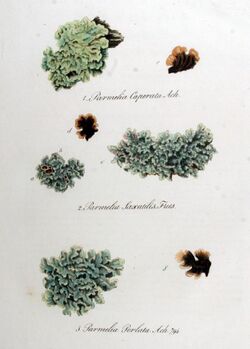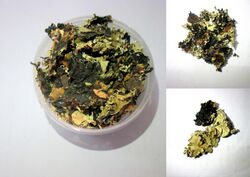Biology:Parmotrema perlatum
| Parmotrema perlatum | |
|---|---|

| |
| Illustration of P. perlatum (bottom) and two other Parmelia species | |
| Scientific classification | |
| Domain: | Eukaryota |
| Kingdom: | Fungi |
| Division: | Ascomycota |
| Class: | Lecanoromycetes |
| Order: | Lecanorales |
| Family: | Parmeliaceae |
| Genus: | Parmotrema |
| Species: | P. perlatum
|
| Binomial name | |
| Parmotrema perlatum (Huds.) M.Choisy (1952)
| |
| Synonyms | |
| |
Parmotrema perlatum, commonly known as black stone flower, is a species of lichen used as a spice in India. The species occurs throughout the temperate Northern and Southern Hemispheres. Typically used in meat dishes like nihari (paaya), Bombay biryani, and goat meat stews, it is also used in vegetarian dishes.
In its raw state, black stone flower does not have much taste or fragrance. However, when put in contact with heat, especially hot cooking oil or ghee, it releases a distinctive earthy, smoky flavour and aroma. This property of black stone flower is especially valued in the tempering step of cooking a number of Indian dishes.[2][3][4]
Some of the other names for it include shaileyam in Sanskrit, kalpasi in Tamil, dagar da phool in Punjabi, dagad phool in Marathi, raathi Pootha (banda puvvu) in Telugu, kallu hoovu in Kannada and patthar ke phool in Hindi, bojhwar[what language is this?] and chadila[what language is this?] in North India.[2]
Gallery
See also
References
- ↑ Hale ME. (1961). "The typification of Parmelia perlata (Huds.) Ach.". Brittonia 13 (4): 361–367. doi:10.2307/2805414.
- ↑ 2.0 2.1 "Food Secrets: 14 Unusual Indian Spices You're Probably Not Using but Definitely Should Try" (in en-US). 2016-08-31. https://www.thebetterindia.com/66546/unusual-rare-indian-spices/.
- ↑ Ratnani, Vicky (2014-04-26). "Magic of Stone Flower" (in en). https://www.dnaindia.com/lifestyle/column-magic-of-stone-flower-1982069.
- ↑ Manmadhan, Prema (2011-05-18). "Karaikudi comes calling" (in en-IN). The Hindu. ISSN 0971-751X. https://www.thehindu.com/features/metroplus/Food/karaikudi-comes-calling/article2029134.ece.
Wikidata ☰ Q6354381 entry
 |





